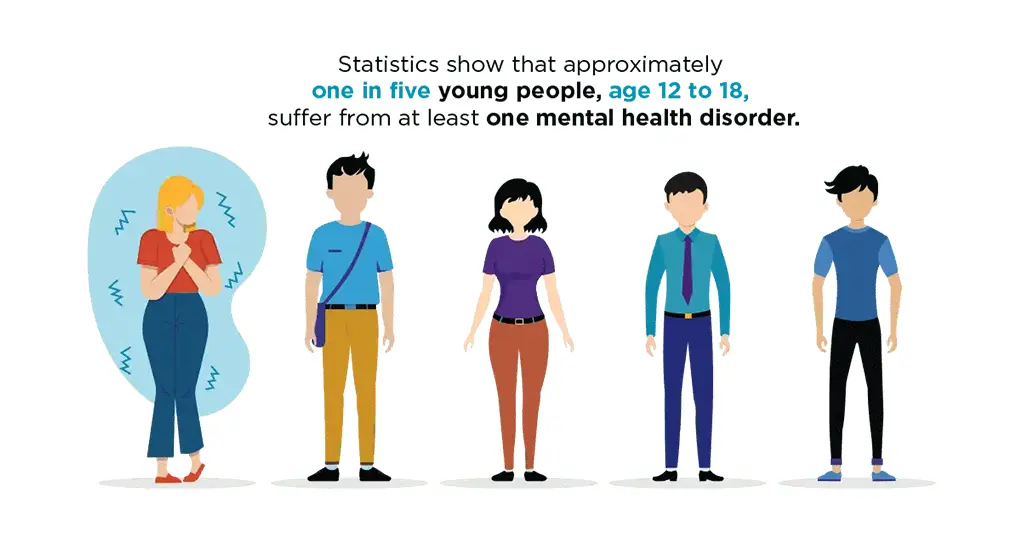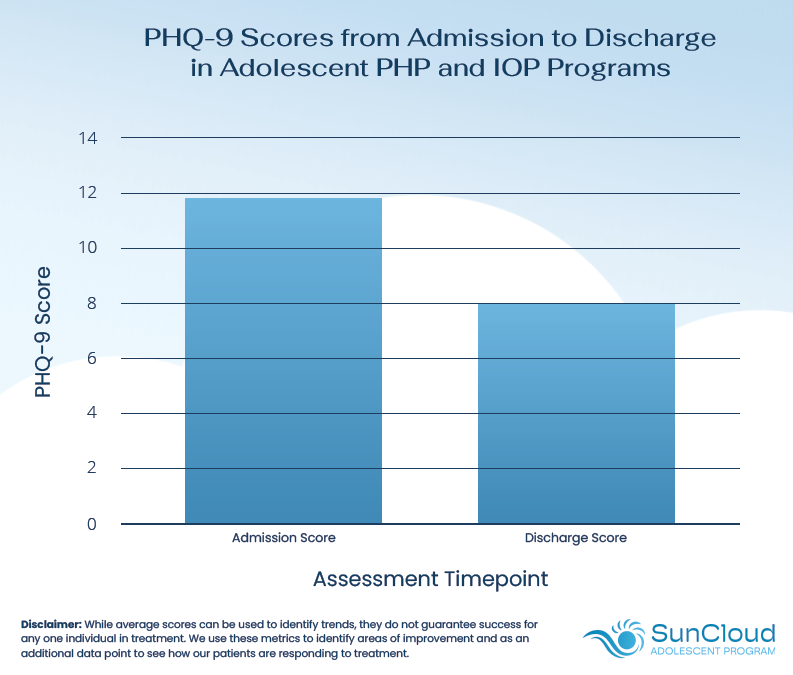Adolescence is a difficult time for many children. Teenagers must deal with peer pressure and pressure to do well in school while trying to make a healthy transition to adulthood. This puts a lot of stress on their shoulders, and it could lead to mental health issues like anxiety, depression, eating disorders, and more.
SunCloud Health is here to help, offering a unique approach for adolescents in school needing more support than conventional therapies. We provide adolescent Intensive Outpatient Programs (IOP) three to five times weekly at our Naperville, Chicago, and Northbrook centers. Adolescent IOP is available Monday through Friday, 4:00 – 7:00pm. Starting June 17th, programming will also be offered from 9am – 12pm or 12pm – 3pm. Please contact us for an assessment to see if our program aligns with the needs of your child, patient, or student.
Are Teen Outpatient Treatment Services right for your child?
Adolescent outpatient treatment involves receiving group and individual therapy in a convenient outpatient environment. So rather than being checked into a residential treatment facility or Partial Hospitalization Program (PHP), they can receive teen outpatient treatment while going about their every day lives, enjoying their adolescence while getting the care they need and developing important tools to overcome their mental health challenges.
While in Intensive Outpatient Program (IOP), teens work through a customized plan that gets to the root of their problems and teaches them healthy coping skills that replace negative thought processes.

What Questions Should Parents Ask a Treatment Provider?
Deciding on teen outpatient treatment or other mental health treatment and counseling options can be difficult to navigate for parents and loved one. The experts at SunCloud Health can guide you through the complicated emotions to determine the best approach for your child.
To start, to make sure the provider really treats the condition, rather than having it be a small portion of what they do. It’s important to ensure your teen’s clinicians speak the language and are truly informed in order to ensure the best possible care. Some important questions to consider when searching for a provider include:
- What is the average group therapy size?
- What is the staff-to-patient ratio?
- How often are you treating the disorders my teenager is dealing with, and is that treatment a regular part of the program?
- Do you offer individual therapy sessions?
- What percentage of patients are also being treated for this condition?
- Can my teen still attend school and, if so, how will they be supported?
- How often will my adolescent see a doctor, therapist, dietitian, and other individual services needed throughout their care and as part of their tailored treatment plan?
We also recommend scheduling a tour of the facility to get a feel for the location, talk to the staff, and make sure the provider’s day-to-day programming meets your child’s needs.
Video: DOES IT MAKE SENSE TO PULL MY KID OUT OF SCHOOL FOR TREATMENT?
Hear from Dr. Chevalier on the balance school and extracurricular activities with inpatient treatment programs and other outpatient care options. In most cases, coursework is unaffected and can be improved while a student is out of school receiving treatment.
Does My Teen Need therapy? Teen Outpatient Programs vs. Other Treatment Options.
Adolescent IOP isn’t the only way you can go when it comes to getting your teen the treatment they need. There are other options, including inpatient treatment programs, taking your child to a school counselor, or simply talking to them yourself. However, adolescent intensive outpatient treatment may be the best solution.
An inpatient program will take your child away from their friends and schoolwork. It will interfere with their curriculum, and it could make them depressed and resistant to treatment. A school counselor may be effective, but with a whole school of children to care for, they won’t be able to give your child the customized care they need. And if you try to talk to them yourself, you run the risk of saying the wrong things and causing a rift in your relationship that will do more harm than good.

Our shared experience of watching our teens struggle with mental health and addiction. – David Newton, SunCloud Health
At first, we think they are just making bad decisions. We justify this by believing that as adolescents, we expect some of this. We naively assume they will grow out of “it” and one day mature. Signs that things might be worse than we hope include a few semesters of unusually poor grades, unexplainable and suspicious behavior, a substantial change in their friend group or months of them suddenly telling us how much they hate us. After months of watching them go downhill, arguing with them and spending hours with close family and friends fruitlessly trying to come up with a solution for our newly diagnosed “difficult child”, we call their school counselor or a local therapist and ask for guidance. If we are fortunate enough to get our kids to actually go see the school counselor or the local therapist (many are not!), once diagnosed with a mental health or addiction diagnosis, we are then faced with questions and thoughts ranging from, “give them more time, things will be fine..”, or “How did this happen to MY CHILD when they had a fairy tale childhood”, or, “Now what do we do?”, or “What did I do wrong and how can I fix this since I am the parent, and nobody knows my child like I do?”
Why SunCloud Health Is a Top Choice for Teen Outpatient Treatment
There are many facilities that offer a teen intensive outpatient program, but SunCloud takes an approach that sets us apart. We combine holistic treatments with evidence-based treatment and therapies, creating a customized plan that’s best suited to our patients’ needs. In doing so, we are better able to address a wide range of mental health symptoms and conditions, ensuring we can provide the care that’s right for your teen. We are dedicated to improving the quality of our patients’ lives.
Don’t let mental health issues and substance use disorders get in the way of your teen’s ability to live life to the fullest. Fill out our form or call us directly to find out more about our teen intensive outpatient program. We will provide the care your child needs to find the health and happiness they deserve.
A Specialized, Individual Approach to IOP Treatment
SunCloud Health has dedicated our attention to the needs of teens and the emotional health issues they face, with specialized outpatient services from skilled and licensed behavioral health professionals who are specially trained to work with young individuals. We create individualized programs for each teen that have teens working with a counselor, participating in group and family therapy sessions (when appropriate).
Treatment is centered around process groups, where patients talk and work together to gain insight and perspective to work through issues. Skills groups are held throughout the day to build upon these insights and teach coping mechanisms for whatever is going on in their lives. Above all, we are group focused, allowing teens to share similar experiences and relate to one another, providing comfort and support.
Teens are also encouraged to communicate outside of their program to build up a community of support.
What We Treat
SunCloud health offers a full range of care tailored to the unique needs of adolescents:
- Anxiety Disorders, including Obsessive-Compulsive Disorder (OCD) and behaviors such as panic attacks
- Teen Depression Treatment (characterized by the lowering of a person’s mood and may lead to a withdrawal from society or lack of interest in things once previously loved)
- Bipolar Disorder, which involves severe mood swings that take a person from euphoric highs to devastating lows that get in the way of basic functioning
- Teen Drug Treatment/Substance Use Disorders (a dual-diagnosis approach that simultaneously treats the addiction, often due to experimentation/peer pressure or a deeper mental health disorder, and its underlying causes, making for long-term recovery)
- Teen Eating Disorder Treatment, including treatment for anorexia, bulimia, binge-eating disorder, and more
- PTSD (caused by a traumatic incident that occurred at some point in a person’s life, causing flashbacks, nightmares, and avoidance of people, places, or things)
- Trauma-Related Disorders, which may manifest as depression, anxiety, or reckless behavior
- Dangerous or Harmful Behaviors, including self-harming and school avoidance
- Grief and Loss Issues
- Family Crises
No Two Teens Are Alike: Individualized Treatment for Mood, Eating Disorders, Substance and Trauma/PTSD
How Does Adolescent Intensive Outpatient (IOP) Work?
The purpose of adolescent intensive outpatient is to provide additional support after school for teens who need more than traditional outpatient therapy but who can also navigate the daily stresses of school. It is to ensure that teenagers can receive the treatment that they need in a personalized and intensive treatment facility while still maintaining social and family connections. Variant adolescent IOP is a multi-step program that includes building problem-solving skills for both school and home, peer support through group therapy, case management, and access to psychiatrists for medical treatment. Variant teen IOP programs at SunCloud Health focus heavily on addressing the root issue while creating supportive and challenging environments geared towards optimal health.
Typical therapy treatment time is 3-4 hours each day, M-F and runs 3-5 days a week, depending on clinical necessity. The purpose is personalized intense treatment with access to home and normal life activities in an after school program setting. Some of the common issues we help with are school suspensions and misbehaviors, teen runaways, self-injury, defiance, suicidal ideation, and substance use.


Teen Outpatient Treatment at SunCloud Health: Chicago (Lincoln Park), Naperville, Northbrook
If you are in the Chicagoland area, including Chicago (Lincoln Park), Naperville, or Northbrook, and are dealing with a teen that is suffering with mental health issues and/or a substance use option, SunCloud Health is the way to go. Let them know they are not alone. We offer teen outpatient treatment Aurora, teen outpatient treatment Naperville and teen outpatient treatment Northbrook. You are guaranteed to find a location that’s close to you.
Available Monday through Friday, 4:00 – 7:00pm
Starting June 17th, programming will be available 9am – 12pm or 12pm – 3pm
The SunCloud Health circle of comprehensive care and support is confidential, and provides compassionate treatment in individual, group, and family therapy settings.
- Treatment that gives teens the resources and skills to move toward a hopeful live worth living
- Patient dignity and confidentiality are our top priority
- We are committed to treating you and your teen with kindness and respect
We’re Here to Help Your Teen on Their Journey to Better Mental Health
Get help for your teen from one of the nations most trusted names in treating teens for substance use addictions, eating disorders and other disordered eating issues, mood disorders, and PTSD and related traumas.
Our Adolescent Team Discusses SunCloud Health’s Outpatient Treatment for Teens
Video: WHAT ROLE DOES FAMILY PLAY IN THE RECOVERY OF ADOLESCENTS?
Alexander Chevalier, MD, Medical Director, Child and Adolescent Psychiatry at SunCloud Health explains the role that family can play in the recovery of adolescents, and the importance of family sessions throughout care.
Video: DR. NICOLE BISHOP, PSYCHOLOGIST AND CLINICAL DIRECTOR ON WORKING WITH ADOLESCENTS.
Dr. Nicole Bishop, Psychologist and Clinical Director on working with adolescence to identify and treat mental health conditions and co-occurring issues.
With attentive services and skillful programs, our specialized team will help your teen learn to problem solve, building confidence to return to a purposeful, fulfilling daily life at home and school.
Video: DR. NICOLE BISHOP, PSYCHOLOGIST AND CLINICAL DIRECTOR ON WHY SUNCLOUD MIGHT BE A GOOD FIT FOR YOU.
Dr. Nicole Bishop, Psychologist and Clinical Director on why SunCloud might be a good fit for you.
Is someone hurting you?
- Child Abuse Hotline:
1.800.25.ABUSE (252.2873) - National Teen Dating Abuse Hotline:
866.331.9474 (TTY 711) - National Suicide Hotline:
1.800.273.TALK (8255) - Lake County Crisis:
847.377.8088 - Loving Outreach to Survivors of Suicide ( L.O.S.S.):
312.655.7283
The Right Treatment Program for Your Teen, the First Time.
We’re Here to Help Your Teen on Their Journey to Better Mental Health
Get help for your teen from one of the nations most trusted names in treating teens for substance use addictions, eating disorders and other disordered eating issues, mood disorders, and PTSD and related traumas.
Depression Symptom Reduction (PHQ-9)
The Patient Health Questionnaire-9 (PHQ-9) is used to evaluate the severity of depressive symptoms. Scores range from 0 to 27, with higher scores indicating more severe symptoms.

Adolescent patients demonstrated substantial improvement in depressive symptoms.
Disclaimer: While average scores can be used to identify trends, they do not guarantee success for any one individual in treatment. We use these metrics to identify areas of improvement and as an additional data point to see how our patients are responding to treatment.
